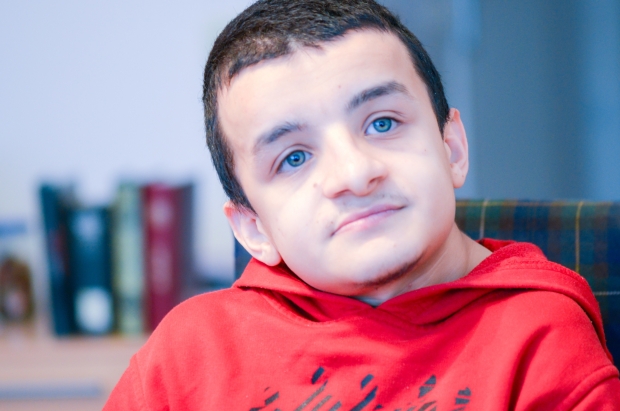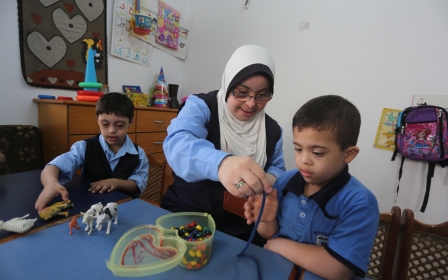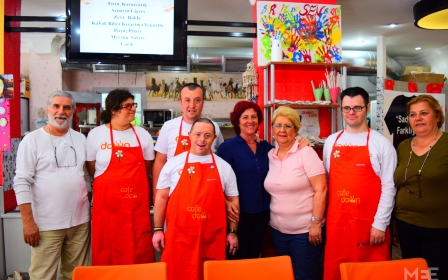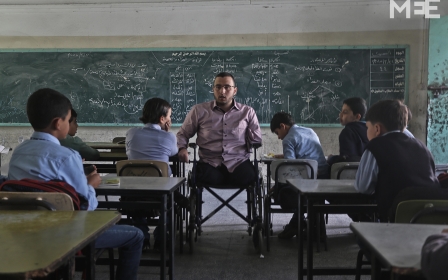New life in Berlin gives disabled Syrian student a fresh start
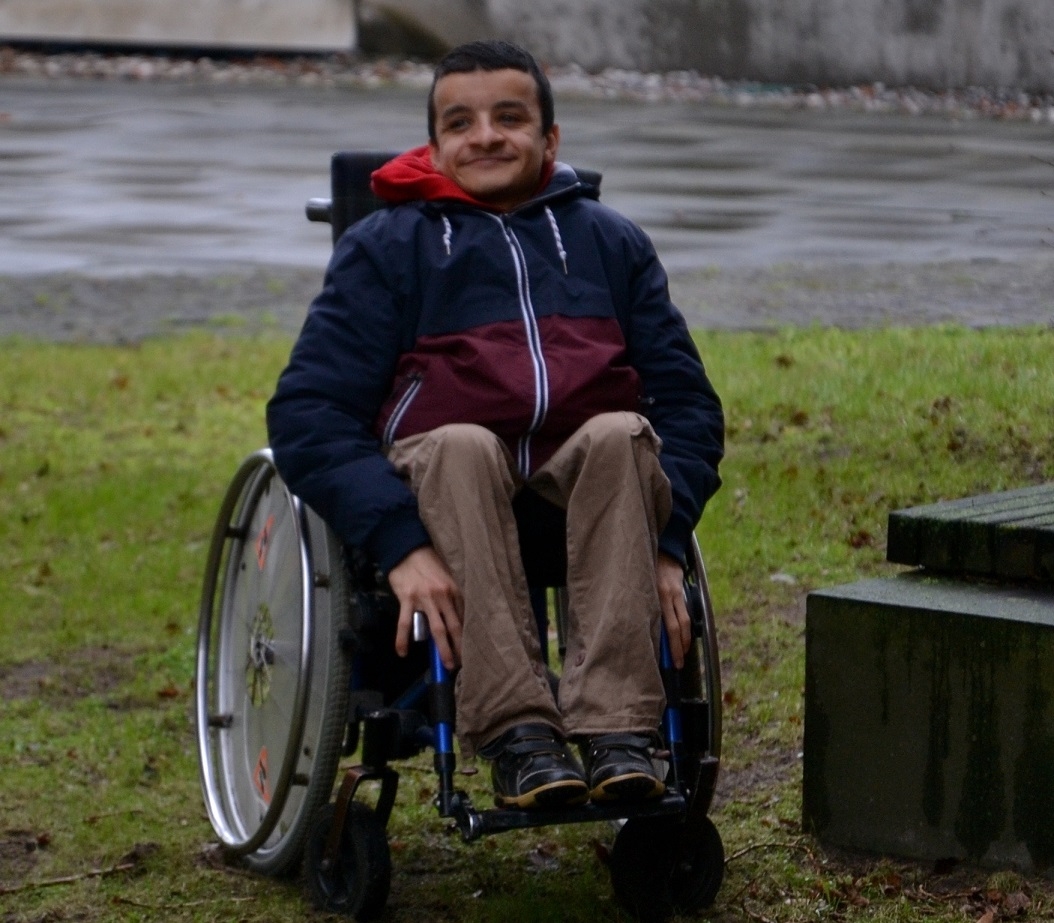
BERLIN, Germany - Seeing Anas al-Hakim navigate the hallways at the Technical University of Berlin, one would think he knows everyone on campus.
“I enjoy meeting people and I have made good friends [in Germany],” said the computer science and mathematics student at the crowded university cafeteria, after saying hello to a friend.
The 25-year-old was born with craniofacial fibrous dysplasia, a rare bone condition. Undergoing painful surgeries his entire life, a spinal operation left him permanently paralysed as a teenager, forcing him to get around in a wheelchair.
After arriving in Germany in 2014, Hakim has found the freedom of movement he only dreamed about when he was in his native Syria.
“Living in Germany is like a dream,” he told MEE. “I can go wherever I want with the transportation system and there are wheelchair accessible ramps in most buildings.”
From Syria to Germany
Syrian President Bashar al-Assad cracked down on pro-democracy protesters in 2011, sparking a civil war. In the last six years more than 400,000 have been killed and at least half of Syria’s 22 million people have been uprooted, including Hakim.
Hakim’s journey to Germany was not an easy one. As the conflict in Syria escalated, many countries closed their embassies in Damascus, including Germany.
Syrians could only obtain visas to Germany from Beirut, Amman, or Istanbul, so Hakim decided to travel to Lebanon with his brother, to obtain a visa there.
He said that the Lebanese authorities were reluctant to allow him inside the country because they were worried he would apply for refugee status.
Lebanon has been strained by the war-torn country next door and hosts more than one million Syrian refugees, who represent around a quarter of its population.
Hakim’s brother and family could not join him on his trip from Lebanon to Germany because they could not afford to pay for the visa, airline tickets and travel expenses. Therefore, he travelled alone with all of his belongings.
Travel costs and his first year of university came out of his own pocket, but later he received a scholarship covering all of his expenses.
Hakim considered himself very lucky in comparison to other disabled Syrians who have to resort to taking overcrowded dinghies across the Mediterranean to get to Europe.
Last week, UN agencies said that at least 5,000 migrants are believed to have drowned in the Mediterranean Sea in 2016 as they struggled to reach Europe
Life on society’s periphery
With his family still in Damascus, Hakim's hometown is never far from his mind. The non-profit organisation Handicap International says Syrians living with disabilities have been “doubly victimised” by the conflict.
Yet as they rebuild their lives in new places around the world, Syrians living with disabilities are determined to not let any condition hold them back.
As they rebuild their lives in new places around the world, Syrians living with disabilities are determined to not let any condition hold them back
Like most countries around the world, life with special needs in Syria has always been a challenge. From social exclusion to a lack of employment and educational opportunities, people living with disabilities are rarely seen on the streets of Damascus, as the country is not equipped to help them lead a normal life. So many people prefer to stay indoors.
“You don’t see someone with a disability very often,” said Hakim. “It’s strange even for [Syrians] to see someone in a wheelchair. They don’t mean to stare or look, but they tend to.”
Moving around the Syrian capital in a wheelchair was a constant struggle. Pedestrian pavements were not designed with smooth slopes to help wheelchair users cross the street safely.
Public transport had not yet been adapted with ramps or straps to secure wheelchairs. Driving a specialised car was an option, but Hakim still needed help getting into the driver’s seat.
Few buildings were outfitted with elevators or ramps, making it impossible for Hakim to even attend certain classes without assistance. His friends would take turns helping him up the stairs in secondary school so that he could be included in the mainstream education system.
“I am an independent person, so I don’t like having to rely on others for help all the time,” he said.
He explained that he didn't want to go to a school for children with special needs, because the quality of teaching in these schools is poor and students with different disabilities are put in the same class.
Despite the difficulties, the Damascene graduated from a mainstream high school, but he realised that by staying in Syria, he would not be able to achieve his goal of attending university.
“None of the public universities were wheelchair accessible and after the war started, it was simply too dangerous for me to travel outside,” he said. “There were military road blocks everywhere and it was a very uncomfortable situation.”
‘Freedom of movement’
It got to the point that Hakim was rarely leaving the house out of fear for his safety. He plunged himself into graphic design and computer programming, but he felt that something was missing.
“At some point, when I couldn’t leave the house anymore, I’d had enough,” he recalled, furrowing his brows over his steel blue eyes. “My life had stopped and I’m not someone who likes stopping.”
Having spent time receiving medical care in Germany as a child, Hakim decided he wanted to pursue his studies abroad. There was always something about German culture that attracted him.
"I like the [German] mentality. Germans are open, ordered and when they describe something, they are direct, unlike Syrians," he said.
Crisscrossing Berlin in his wheelchair, Hakim finds the city relatively easy to navigate alone. While not all subway stops have elevators, he is able to use certain stations or take buses.
Finding housing was a bit of a challenge, but he was able to find a ground-floor apartment equipped for his needs.
"I prefer everything in Berlin to Damascus. My family is there [Damascus], but here I can move freely with my wheelchair. It comes down to the freedom of movement," he said.
Medical support for newcomers with disabilities
There is currently no data on how many newcomers to Germany are living with disabilities. According to a 2014 Handicap International report, one in five Syrian refugees in Jordan and Lebanon have a physical, sensory, or intellectual impairment.
“In Syria, accessing care if you are physically handicapped is even more difficult than it was before,” Florian Westphal, managing director of Doctors Without Borders, Germany told MEE. “Whatever system that was there to look after you before, it’s probably collapsed like much of the healthcare system.”
Under German law, asylum seekers and undocumented migrants are provided state-subsidised medical and dental care only for acute pain and illness for their first 15 months in the country.
This legislation is rather restrictive compared to fellow European powerhouse France, where every person possesses the same right to healthcare, regardless of citizenship or migration status.
“We see people who don’t receive medical care or medicine for their conditions for 15 months,” explained Ricarda Wank, coordinator of the ComIn project for refugees and migrants with disabilities. “This is problematic.”
Westphal says there are also many invisible disabilities, such as post-traumatic stress disorder and other mental illnesses, which have been caused by trauma experienced not only at home, but also on the road to Germany.
“One just has to imagine somebody in a wheelchair trying to get into an overcrowded dingy in Libya to Italy,” said Westphal. “Germany can directly resettle refugees with disabilities so that they aren’t obliged to put themselves in the hands of people smugglers.”
From assistance to independence
Providing medical care is only one aspect of supporting newcomers with different needs to become self-sufficient in their new country.
“Germans living with disabilities are still not fully included in society,” explained Wank, who lives with a disability. “For newcomers, it is even more difficult. They can feel isolated.”
Launched in 2003, ComIn helps integrate new arrivals living with disabilities in Munich. Volunteers offer German classes, computer courses, and mobility training. They also help their students find employment with local companies.
Much of their offerings are tailored to specific needs. With the support of the government, the project has developed language classes using Braille and other techniques to help visually impaired people learn German.
The non-profit organisation would like to see state-run initiatives, such as mainstream integration classes and work placement programmes adapted to include people with special needs to help them better adapt to German society and the job market.
“There have been advances, but these special education tools are necessary. It still takes four years for a person living with a disability to receive financial support for specialised training from the government,” said Wank. “What are they supposed to do in the meantime?”
Mobility is another big concern for many new arrivals, especially for those who have recently become disabled during conflict.
Unfamiliar with their surroundings, volunteers give lessons on how to take public transport, read maps in German, and the different technology designed to make Munich a friendlier city for people with disabilities.
Volunteers give lessons on how to take public transport, read maps in German, and the different technology designed to make Munich a friendlier city for people with disabilities
“Our goal is to help individuals become independent and plan what goals they want to achieve,” she told MEE.
Moving forward
Back in Berlin, Hakim is busy organising his schedule between assignments, social events and meetings. He said he will not let anything get in the way of his future plans.
He aims to finish a bachelor's and master’s degree in the next five years. Afterwards, he plans to find a job in computer science or mathematics.
“I am from Syria, but I would like to spend the rest of my life in Germany,” he said. “My quality of life is better here, but I will still go back for short visits.”
The student has also become a role model in the Syrian community and beyond. One of his projects is Make It German, a project that helps Arabic-speaking students navigate life in Germany.
“I want to help other international students to adapt to life in Germany,” he said. “I honestly believe there is a lot to offer here.”
Middle East Eye propose une couverture et une analyse indépendantes et incomparables du Moyen-Orient, de l’Afrique du Nord et d’autres régions du monde. Pour en savoir plus sur la reprise de ce contenu et les frais qui s’appliquent, veuillez remplir ce formulaire [en anglais]. Pour en savoir plus sur MEE, cliquez ici [en anglais].


